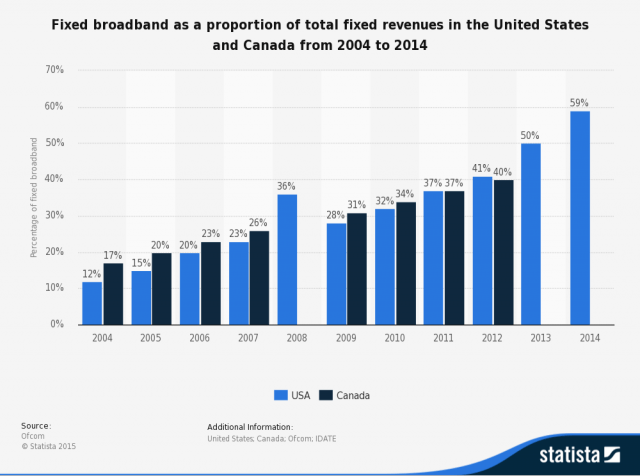 Frontier Communications CEO Dan McCarthy blames slow Internet connections on your lousy home Wi-Fi network, not on his company’s broadband service.
Frontier Communications CEO Dan McCarthy blames slow Internet connections on your lousy home Wi-Fi network, not on his company’s broadband service.
McCarthy hoped to convince investors attending the J.P. Morgan Global High Yield & Leveraged Finance Conference earlier this month that Frontier’s last-mile network performance isn’t the real problem, it’s his customers’ Wi-Fi, and delivering faster broadband service isn’t going to solve many speed woes.
“I think the biggest issue that we face in having those kind of increments of capacity is the experience in the home can be substandard not only for us and they perceive a speed issue, but it’s really a Wi-Fi issue,” McCarthy said. “If you look at that many of the perceived speed issues in a home are purely due to a neighbor on the same Wi-Fi channel, which can cut your throughput by 50 percent.”
McCarthy claimed at least 40 percent of the complaints Frontier customers lodge about the company’s broadband service relate to the home Wi-Fi experience. Oddly, customers of other broadband providers don’t seem to complain as much about the performance of their Internet access provider. Frontier scores #12 on Netflix’s speed performance ranking, delivering an average of 2.51Mbps video streaming performance. It isn’t great, but it beat Windstream, Verizon DSL and last place CenturyLink.
 Frontier Communications has promised to commit additional investment to expand and improve broadband after it completes its purchase of Verizon landlines in Florida, California, and Texas. Copper DSL customers may eventually get 25Mbps service, fiber customers up to 1Gbps. But the speed improvements have not been as forthcoming in Frontier’s original service areas, dubbed “legacy territories.”
Frontier Communications has promised to commit additional investment to expand and improve broadband after it completes its purchase of Verizon landlines in Florida, California, and Texas. Copper DSL customers may eventually get 25Mbps service, fiber customers up to 1Gbps. But the speed improvements have not been as forthcoming in Frontier’s original service areas, dubbed “legacy territories.”
McCarthy claimed more customers within its copper service areas will get speeds of 25-30Mbps, with some getting speeds of 100Mbps and above. But legacy customers often report they consider themselves lucky to see 6Mbps from Frontier DSL.

McCarthy
Despite that, McCarthy seemed to signal Frontier will direct much of its investment into its newest acquisition service areas, not the communities which have had Frontier DSL service for a decade or more.
“We’re investing in the copper facilities as we go into these three states,” McCarthy said. “We’ll be putting in the latest generation of bonded VDSL with vectoring capabilities at the DSLAM and that gives us the ability to have those 80-100 Mbps speeds.”
McCarthy does get the benefit of bragging the company has a larger amount of fiber broadband than ever before.
“Before we do the three-state acquisition, about 10 percent of our markets are passed with fiber-to-the-home and with these three markets about 55 percent of those markets are fiber-to-the-home,” McCarthy said. “We’ll have a substantial slug of markets passed with fiber.”
This excludes the fact Frontier did not build this additional fiber infrastructure itself. It acquired it from another company, in this case Verizon.


 Subscribe
Subscribe

 The local hero? Rep. Art Swann (R-Maryville) who voted yes (
The local hero? Rep. Art Swann (R-Maryville) who voted yes ( On Monday, Stop the Cap! joined 21 other public interest organizations in
On Monday, Stop the Cap! joined 21 other public interest organizations in 
 Entrenched telecom industry lobbyists and a legislature enriched by their campaign contributions chose the interests of AT&T, Comcast, and Charter Communications over the broadband needs of rural Tennessee, killing a municipal broadband expansion bill already scaled down to little more than a demonstration project.
Entrenched telecom industry lobbyists and a legislature enriched by their campaign contributions chose the interests of AT&T, Comcast, and Charter Communications over the broadband needs of rural Tennessee, killing a municipal broadband expansion bill already scaled down to little more than a demonstration project.


